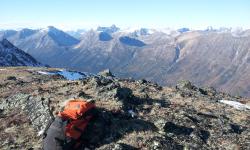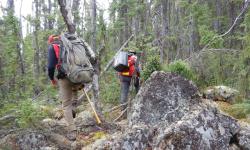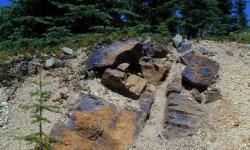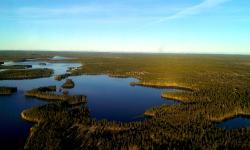Eagle Plains Partner Intersects High Grade Copper at Knife Lake Project
Saskatchewan | April 30, 2019Cranbrook, B.C., April 30th 2019: Eagle Plains Resources Ltd. (TSX-V: EPL) has received notice from Rockridge Resources (Frankfurt: RR0) (TSX-V: ROCK) (Frankfurt: RR0) that it has received results from drilling completed during its 12 hole, 1053 m inaugural winter drill program at its flagship Knife Lake Project located in Saskatchewan (the “Knife Lake Project” or “Property”). Interpretation and QA/QC has been completed on the first two holes and additional results will be released as interpretation and QA/QC work is completed. Rockridge recently entered into an Option Agreement with Eagle Plains Resources Ltd. to acquire a 100% interest in the Property that covers the majority of the historical Knife Lake Cu-Zn-Ag-Co VMS deposit. The contiguous claims total approximately 85,196 hectares and are located approximately 50 km northwest of Sandy Bay, Saskatchewan.
See Knife Lake regional map
Analytical results ranged from trace values to broad, high grade intercepts, as summarized below. Drill holes KF19001 and KF19002 successfully confirmed mineralization in historical drill holes. Drill hole KF19001 intersected net-textured to fracture-controlled sulphide mineralization between 7.5m to 40.6m, returning 33.1m (core length) of 1.28% Cu, 0.12 g/t Au, 4.80 g/t Ag, 0.13% Zn, and 0.01% Co for an estimated 1.49% CuEq. Drill hole KF19002 intersected net-textured to semi-massive sulphide mineralization between 9.7m to 53.5m, returning 43.8m (core length) of 0.78% Cu, 0.07 g/t Au, 2.54 g/t Ag, 0.07% Zn, and 0.01% Co for an estimated 0.93% CuEq. Of note, anomalous gallium of up to 23.1 ppm and indium of up to 15.2 ppm were intersected in both the mineralized zones from holes KF19001 and KF19002. Highlighted intersections from the first two drill holes are reported in the table below.
Drill Results Table:
| Hole | From | To | Core Length * | Cu | Au | Ag | Zn | Co | CuEq ** |
|---|---|---|---|---|---|---|---|---|---|
| (m) | (m) | (m) | (%) | (g/t) | (g/t) | (%) | (%) | (%) | |
| KF19001 | 7.5 | 40.6 | 33.1 | 1.28 | 0.12 | 4.8 | 0.13 | 0.01 | 1.49 |
| Upper Int. | 7.5 | 13.6 | 6.1 | 1.67 | 0.21 | 7.2 | 0.31 | 0.01 | 1.99 |
| Includes | 7.5 | 11.5 | 4 | 2.29 | 0.29 | 9.8 | 0.43 | 0.01 | 2.72 |
| Middle Int. | 19.5 | 24.1 | 4.6 | 1.70 | 0.14 | 5.9 | 0.15 | 0.01 | 1.94 |
| Includes | 21.5 | 23.5 | 2 | 2.06 | 0.23 | 8.2 | 0.26 | 0.02 | 2.46 |
| Lower Int. | 30.7 | 40.6 | 9.9 | 1.56 | 0.13 | 6.1 | 0.11 | 0.02 | 1.81 |
| Includes | 36.7 | 38.7 | 2 | 3.37 | 0.33 | 14.4 | 0.26 | 0.03 | 3.88 |
| KF19002 | 9.7 | 53.5 | 43.8 | 0.78 | 0.07 | 2.54 | 0.07 | 0.01 | 0.93 |
| Includes | 24.3 | 42 | 17.7 | 1.27 | 0.11 | 3.71 | 0.07 | 0.02 | 1.47 |
| Includes | 25.4 | 30.5 | 5.1 | 2.03 | 0.10 | 5.04 | 0.11 | 0.02 | 2.28 |
| Includes | 29.5 | 30.5 | 1 | 5.97 | 0.21 | 15.4 | 0.28 | 0.04 | 6.49 |
* Drill indicated intercepts (core length) are reported as drilled widths and true thickness is undetermined
** Assumptions used in USD for the copper equivalent calculation were metal prices of $2.80/lb Cu, $18.00/lb Co, $1,300/oz Au, $17.00/oz Ag, $1.20/lb Zn and a processing cost of $11.55/tonne. Copper equivalent (CuEq) was calculated using the formula CuEq = Cu% + ((Zn%*Zn Price*Zn Recovery*Zn Payable*22.0462) + (Co%*Co Price *Co Recovery*Co Payable*22.0462) + (Augpt*Au Price*Au Recovery*Au Payable/31.1035) + (Ag *Ag Price*Ag Recovery*Ag Payable/31.1035)) / (Cu price*CuRecov*Cupayable*22.0462)
See Knife Lake Plan Map and Drill Collar Locations
Rockridge completed twelve holes consisting of 1,053m of diamond drilling in the 2019 winter drill program. This represents the first work on the property since 2001 and has two primary objectives: confirm the tenor of mineralization reported by previous operators and expand known zones of mineralization. All activities will advance the project toward the goal of completing a NI 43-101 compliant mineral resource estimate.
Compilation and initial modelling indicates potential for expansion of the historical deposit at depth. The current drilling has been focused on resource upgrade and expansion as well as infill drilling between historical holes. The program will also give valuable insights into the property geology, alteration, and mineralization that will be applied to future regional exploration on the highly prospective and underexplored land package.
Knife Lake contains typical VMS mineralogy which has been significantly modified and partially remobilized during the emplacement of granitic rocks. Therefore, the known historical deposit may represent a remobilized portion of a presumably larger “primary” VMS deposit based on general observations about the mineralogy, mineral textures and metal ratios in the deposit. Most of the historical work consisted of shallow drilling at the deposit area with little regional work carried out and limited deeper drilling below the deposit. As a result, there is strong discovery potential both at depth and regionally.
Knife Lake Geology and History
The Knife Lake Project is interpreted to be a remobilized VMS deposit. The stratabound mineralized zone is approximately 15m thick and contains copper, silver, zinc and cobalt mineralization which dips 30° to 45° eastward over a strike-length of 4,500m, with an average horizontal width of approximately 300m. Over 400 diamond drill-holes have been completed in and around the current property boundaries, with much of the drill core stored under cover and in very good condition.
The deposit is hosted by felsic to intermediate volcanic and volcaniclastic rocks which have been metamorphosed to upper amphibolite facies. The deposit is typical of VMS mineralogy which has been significantly modified and partially remobilized during the emplacement of granitic rocks. The mineralization straddles the boundary between two rock units and occurs on both limbs of an overturned fold.
The Knife Lake area saw extensive exploration from the late 1960s to the 1990s with the last documented work program completed in 2001. Drilling has outlined a series of stratabound mineralized lenses which are controlled by complex geological structures. In the copper mineralized zone, significant thickening of the mineralization occurs near the central portion of the deposit. Sulphides and rare native copper are visible in outcrop. Massive sulphides consist of 25% to 60% pyrrhotite and 0.2% to 10% chalcopyrite mineralization. Pyrite is present as irregular disseminations and masses. Locally, up to 8% sphalerite (zinc mineralization) is present.
The first documented work in the Knife Lake showing area occurred between 1969-1973, consisting of ground and airborne geophysical surveys and extensive soil geochemical sampling. The discovery drill-hole, collared in September 1969, returned 2.37% Cu over 4.48 m from 19.96-24.44m, including 3.5% Cu over 2.5 m from 20.27-22.77m. A total of 96 diamond drill holes (8,232m) were completed between 1969 and 1971, and in 1973 Straus Exploration announced a maiden resource on the Knife Lake Deposit. Other previously reported historical drill results include 1.37% Cu, 5.07 g/t Ag, 115 ppm Co, 1182 ppm Zn over 60.13m (core length) beginning at a depth of 2.37m in hole K-96-02 as well as 0.99% Cu, 4.73 g/t Ag, 103 ppm Co over 38.83m (core length) beginning at a depth of 6.11m in hole K-96-36.
Hudson Bay Exploration and Development Company Ltd. later carried out a regional Airborne EM geophysical survey in the Knife Lake – Scimitar Lake area, followed up by geological mapping, prospecting, ground geophysics, and diamond drilling. The property was subsequently optioned to Copperquest Incorporated in 1989, who carried out further geophysical and geochemical surveys and optioned the property to Leader Mining International in 1996. Between 1996 and 2001, Leader flew various airborne geophysical surveys in the area, including electromagnetic (“EM”), magnetic, and gravity surveys. This was followed up with stripping and trenching of the outcropping deposit area. Ground TEM, magnetic, ground IP/Resistivity and VLF-EM surveys were completed over and adjacent to the main deposit area.
Between 1996 and 1998, Leader completed 315 diamond drill holes, outlining a broad zone of mineralization occurring at less than 100 meters depth (AF 63M-0006, Report 10). Late in 1998, Leader published a historical estimate for the deposit, reporting a drill-indicated resource of 20.3 million tonnes grading 0.6% Cu, 0.1 g/t Au, 3.0 g/t Ag, 0.06% Co and 0.11% Zn. Within the historical estimate, there is a higher grade zone containing 11.0 million tonnes grading 0.75% Cu in addition to other metals (SMDI 0406). All disclosed historical estimates were completed prior to the passing of NI 43-101 into law and as such the Company advises that these mineral resource estimates, as disclosed, are not supported by a compliant National Instrument 43-101 technical report, contrary to NI 43-101. A qualified person has not done sufficient work to classify these historical estimates as current mineral resources or mineral reserves in accordance with NI 43-101. The above resource estimates are from the Saskatchewan Mineral Deposit Index (SMDI) 0406. The Company is not treating the historical estimates as current mineral resources or mineral reserves. These estimates do not comply to categories prescribed by National Instrument 43-101 or the Canadian Institute of Mining, and are disclosed only as indications of the presence of mineralization and are considered to be a guide for additional work. The historical models and data sets used to prepare these historical estimates are not available to Eagle Plains and the author is not aware of any more recent resource estimates or data. The 1998 historical resource was calculated using the cross-section method and used assay data from 241 Leader holes and from 6 other holes drilled prior to Leader’s drilling. A cutoff grade of 0.3% copper-equivalent and a minimum composite length of 3.0 meters was used. Holes were plotted on vertical drill sections ranging from Section 20760 N to Section 24905 N, covering a strike length of 4,145 meters. The categories used for the Leader Mining 1998 historical resource estimates are stated as being “drill-indicated”. This is not a resource category as defined under 43-101 CP Section 2.4 (1) and (2)6 but based on the methodologies and drill hole spacing it would likely be equivalent to an inferred resource category.
In 1997, Leader International shipped a 2.4 tonne bulk sample of mineralized material excavated from the surface outcrop of the Knife Lake deposit to Lakefield Research Limited for metallurgical test-work. Lakefield concluded that the copper metallurgy was straightforward. Following a simple flowsheet, greater than 90% copper recovery was achieved at a concentrate grade of 28% Cu. Gold recovery in the copper concentrate was 80%. The cobalt recovery in the copper cleaner concentrate was 13%, with 28% of the cobalt present in cleaner tailing products. Another 48% of the cobalt was present in the sulphide concentrate.
A 357kV powerline runs within 16 km of the Knife Lake Deposit area, greatly enhancing the project’s infrastructure.
QA/QC
Samples were sent for geochemical analysis with ALS Global, Vancouver for the following analyses: 48 element four acid ICP-MS (ME-MS61) and gold (Au) 30 g Fire Assay – AA finish (Au-AA23). Over limit analysis were completed using the following analyses: Ore Grade copper (Cu), nickel (Ni) and zinc (Zn) – four acid ICP-AES (ME-OG62).
On receipt of final certificates of analysis, the QA/QC sample results were reviewed to ensure the order of samples were reported correctly, that the blanks ran clean, and that the results for each standard had minimal variance from its certified value. QA/QC for the Knife Lake drilling included certified reference material (“CRM’s”) and blanks that were inserted into each sample batch in order to verify the analytical from the lab. The CRM’s from the first two drill holes reported passed within 2 standard deviations and the blanks returned acceptable values. All of the lab internal standards and duplicates were within acceptable values.
Complete analytical results are available on the Rockridge Resources website.
Drill Collar Summary Table
| Hole ID | Easting | Northing | Elevation | Azimuth | Dip | Depth |
|---|---|---|---|---|---|---|
| (m) | (m) | (m) | (m) | |||
| KF19001 | 641595.5 | 6194192.6 | 387 | 283 | -90 | 90 |
| KF19002 | 641622.7 | 6194154.3 | 389 | 283 | -65 | 90 |
Qualified Person
The drill program was carried out by Michelle McKeough, of TerraLogic Exploration Services Ltd. under the supervision of Charles C. Downie, P.Geo., a “qualified person” for the purposes of National Instrument 43-101 - Standards of Disclosure for Mineral Projects, and a Director of Eagle Plains Resources Ltd., who has prepared, reviewed, and approved the scientific and technical disclosure in this news release.
Knife Lake Agreement
To earn a 100% interest in the Knife Lake Project, Rockridge has agreed to make a cash payment to Eagle Plains of $150,000 upon regulatory approval (complete), issue up to 5,250,000 common shares of Rockridge (2M shares issued to date) and complete $3,250,000 in exploration expenditures over four years. Eagle Plains will retain a 2% net smelter royalty (“NSR”) on certain claims which comprise the project area. Under the terms of the agreement Rockridge is designated as the Operator of the project.
About Eagle Plains Resources Ltd.
Based in Cranbrook, B.C., Eagle Plains continues to conduct research, acquire and explore mineral projects throughout western Canada. The Company is committed to steadily enhancing shareholder value by advancing our diverse portfolio of projects toward discovery through collaborative partnerships and development of a highly experienced technical team. Managements’ current focus is to preserve its treasury while advancing its most promising exploration projects. In addition, Eagle Plains continues to seek out and secure high-quality, unencumbered projects through research, staking and strategic acquisitions. Since 2012, Eagle Plains has added to its portfolio a number of new projects exceeding 130,000 ha targeting mainly gold, uranium and base-metals in Saskatchewan, a highly-prospective mining jurisdiction which was recently recognized by the Fraser Institute as the second best place in the world in terms of Investment Attractiveness. Throughout the exploration process, our mission is to help maintain prosperous communities by exploring for and discovering resource opportunities while building lasting relationships through honest and respectful business practices.
Expenditures from 2011-2018 on Eagle Plains-related projects exceed $20M, most of which was funded by third-party partners. This exploration work resulted in approximately 30,000 m of diamond-drilling and extensive ground-based exploration work facilitating the advancement of numerous projects at various stages of development.
On behalf of the Board of Directors
“Tim J. Termuende”
President and CEO
For further information on EPL, please contact Mike Labach at 1 866 HUNT ORE (486 8673)
Email: mgl@eagleplains.com or visit our website at https://www.eagleplains.com
Cautionary Note Regarding Forward-Looking Statements
Neither the TSX Venture Exchange nor its Regulation Services Provider (as that term is defined in the policies of the TSX Venture Exchange) accepts responsibility for the adequacy or accuracy of this release. This news release may contain forward-looking statements including but not limited to comments regarding the timing and content of upcoming work programs, geological interpretations, receipt of property titles, potential mineral recovery processes, etc. Forward-looking statements address future events and conditions and therefore, involve inherent risks and uncertainties. Actual results may differ materially from those currently anticipated in such statements.
Latest News Releases

Eagle Plains and Sun Summit Minerals Execute Option Agreement for the Theory Copper-Gold Project, British Columbia

Eagle Plains and Earthwise Minerals Execute Option Agreement for the Iron Range Gold Project, British Columbia

Eagle Plains and Partner Refined Energy Receive Permit for Drilling at Dufferin West Uranium Property, Saskatchewan

Eagle Plains Announces Letter of Intent with Earthwise Minerals for Option of the Iron Range Project, British Columbia

Eagle Plains Partner Xcite Resources Reports Results From Fieldwork at the Uranium City Area Projects, Saskatchewan

